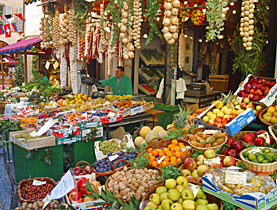Putting food and health on menu of EU talks

Switzerland and the European Union are due to launch negotiations this week on a free-trade accord on agriculture, including food safety and public health.
The government faces criticism by farmers’ organisations which argue that a deal with Brussels would put the country’s agricultural sector at risk.
Economics Minister Doris Leuthard will travel to Brussels on Tuesday to meet the European Commissioner for Agriculture Mariann Fischer Boel, paving the way for talks on the free-trade accord.
The negotiations – to take up to two years – are aimed at abolishing taxes, quotas as well as the mutual recognition of product safety regulations for goods including milk, cheese as well as seeds and machines.
Lukas Gresch of the Swiss Integration Office says the planned agreement is a step towards closer relations with the EU – Switzerland’s main trading partner.
“A deal would help ease access to the EU market. Swiss consumers stand to benefit from lower food prices and the economy is likely to see a sustainable increase in Gross Domestic Product of about 0.5 per cent or SFr2 billion ($1.74 billion).”
Government officials are optimistic that an accord is in the interest of both Switzerland and the 27-nation bloc.
Concerns
However, the leading Swiss Farmers Association has come out against such a deal, saying two out of three farmers in the country would be forced to throw in the towel.
Instead the association calls for the removal of certain trade rules without scrapping tariffs across the board.
“The government might have to change its agricultural policy, including the payment of product-related subsidies,” a statement said.
The association says a full liberalisation of the agricultural sector would boost trade at the expense of the environment.
The conservative Agricultural Centre Switzerland, which has close ties with the rightwing Swiss People’s Party, is categorically against any negotiations.
“It is irresponsible to endanger the country’s self-sufficiency,” says its president, Josef Kunz. He said his group would launch an awareness campaign and was considering forcing a nationwide vote on the issue.
Consumers
The government has acknowledged that an opening up of the agricultural sector is putting pressure on farmers and pledged additional support.
It argues that transitional periods or the use of minimal standards would soften the blow for farmers.
The government will fight to maintain the high standard of animal protection and the restrictive legislation on genetically-modified organisms (GMO) in Switzerland, according to Manfred Bötsch of the Federal Agriculture Office.
For his part Thomas Zeltner, head of the Federal Health Office, points out the importance of food safety for consumers, including labels of origin.
Also important, Zeltner said, is the exchange of information with regard to the Rapid Alert System for Food and Feed (RASFF) to avoid a scandal like the recent one in China involving milk formula tainted with melamine.
He added that it was in the interest of both the EU and Switzerland to increase cooperation on disease prevention and health promotion.
“Epidemics don’t stop at the border,” he said.
Referendum
Switzerland is locked in a controversy with Brussels about tax breaks for holding companies from the EU. Switzerland also came under fire from Germany last month for allegedly encouraging tax evasion.
Relations with Brussels will be the subject of another nationwide ballot next February.
Voters will have the final say on the continuation of a key labour accord between Switzerland and Brussels and its extension to the latest EU members Romania and Bulgaria.
Small rightwing groups collected enough signatures to challenge parliament’s approval of the moves earlier this year.
swissinfo, Urs Geiser
Switzerland and the EU have concluded 20 major bilateral treaties including the 1972 free trade accord on industrial goods.
There are also about 100 secondary bilateral accords between Bern and Brussels.
Negotiations are underway for a bilateral treaty aimed at regulation access to cross-border electricity and streamlining security standards.
Switzerland is not a member of the 27-nation EU. In 1992 voters rejected a plan to join the European Economic Area (EEA), a halfway house to full EU membership.

In compliance with the JTI standards
More: SWI swissinfo.ch certified by the Journalism Trust Initiative













You can find an overview of ongoing debates with our journalists here . Please join us!
If you want to start a conversation about a topic raised in this article or want to report factual errors, email us at english@swissinfo.ch.